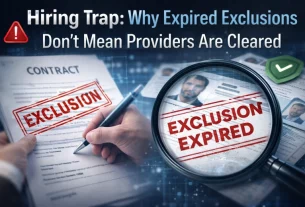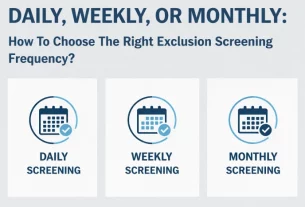CMS, or the Centers for Medicare & Medicaid Services, uses the open payments program to ensure financial transparency in the healthcare industry. It publicly discloses financial transactions and transfers of value of any kind made by drug and medical device companies to physicians, nurses, and other covered recipients. CMS Open Payments offers financial transparency, which is highly beneficial for building patient trust and ensuring ethical medical practices.
Transparent financial reporting is crucial for healthcare providers as it shows that they have nothing to hide. Healthcare vendors are also covered in this open payments program as they provide drugs and other essential services. This database reveals the relationship between the vendor and healthcare providers. Consequently, it helps the healthcare providers in vendor compliance checks and verifies the quality of their services. In this blog, we will cover the CMS open payments and why they are crucial for the healthcare industry.
What is CMS Open Payments, and Its Importance in the Healthcare Industry?
CMS Open Payments was created as part of the Physician Payment Sunshine Act and was intended to bring accountability in the healthcare industry. The true motive of the open payments CMS is to provide the general public with transparent financial relationship data between healthcare vendors and healthcare providers. Payment programs are a crucial factor in verifying the services offered by healthcare providers. The data can also be used to see the ethical values of the healthcare professional. It provides a clear picture of whether the professional’s services are affected by financial donations. Here, we have broken down the entire open payments CMS process for easy understanding.
| Step | Who’s Involved | What Happens | Outcome |
|---|---|---|---|
| 1. Data Collection | Manufacturers & GPOs (vendors) | Track all payments and transfers of value made to physicians, teaching hospitals, and advanced practice providers. | Raw payment/ownership data is collected. |
| 2. Data Submission | Manufacturers & GPOs → CMS | Vendors submit annual reports of their collected data through the CMS Open Payments system. | CMS receives detailed payment records. |
| 3. Data Review & Dispute | Healthcare Providers | Providers log in to the Open Payments portal to review what vendors have reported about them. They can accept or dispute the data. | Errors can be corrected before publication. |
| 4. Data Validation | CMS | CMS checks submissions for accuracy, resolves disputes, and ensures reports meet Sunshine Act requirements. | Finalized, validated dataset. |
| 5. Public Release | CMS → General Public | CMS publishes the data in the Open Payments database (online, searchable, and publicly accessible). | Patients, regulators, and the public can view financial relationships. |
| 6. Ongoing Compliance | Providers & Vendors | Both sides maintain proper reporting, dispute resolution, and ethical standards year after year. | Continuous transparency and compliance. |
Venops for Automated CMS Open Payments Reporting
Venops has been a trusted compliance partner for healthcare providers. Our technical expertise allows us to integrate technology into the screening process and generate an accurate report using the latest CMS open payment data. This not only increases speed but also ensures complete accuracy in CMS reporting and compliance checks. Our automated reporting program can track all kinds of payments and transfers of value. Thus, helps you bring transparency to your healthcare services and avoid non-compliance penalties.
Essential Benefits with Venops
- Healthier financial relationships with transparency
- Growth in the organization’s reputation with clean financial records
- Avoid financial penalties of up $100,000
- Automated report generation with modern software tools
- Assured vendor compliance with complete verification and financial background checks
- Covering open payments data physicians, vendors, and other members of the healthcare sector
- A wide range of screening services, including OIG screening, vendor screening, automated monthly screening, and many more.
Wrapping It Up!
Transparency in the healthcare industry goes a long way and helps healthcare providers maintain a good reputation among patients. And this is precisely why CMS introduced the Open Payments program. Open Payments CMS provides the general public with financial information on the relationships between drug manufacturers, vendors, and equipment suppliers and teaching hospitals and medical professionals. Venops helps healthcare providers ensure that CMS payments are accurate and complete. This can help your healthcare organization avoid financial and reputational losses.
Avoid unnecessary expenditure of your precious working hours with Venops. Contact us to know more!
FAQS
Q.1: What happens if I do not report a transaction in the CMS payments reporting?
A: The financial disclosure under the Open Payments CMS is bound by the law. Therefore, in case the healthcare provider or the service providers do not report a transaction, they will be liable for CMPs. The financial penalties can range from $ 1,000 to $ 10,000, depending on the severity of the violation.
Q.2: What are covered recipients and reporting entities?
A: Covered recipients under open payments CMS programs are those parties and individuals who receive payment and transfer of value. It mainly includes physicians, Nurses, and teaching hospitals. On the other hand, the reporting entities include drug manufacturers and applicable group purchasing organizations.
Q.3: What is vendor compliance, and how is it related to the Open Payments CMS program?
A: CMS open payments programs play a crucial role in ensuring that you only work with well-qualified vendors with a clean financial background. The CMS payment programs reveal any anomalies in the financial records of vendors with their previous healthcare providers.
Q.4: What are the crucial considerations to keep in mind during CMS Open Payments Reporting?
A: Here are concise pointers for CMS Open Payments reporting considerations:
- Identify covered recipients correctly (use NPI & CMS hospital list)
- Classify payments under the right CMS categories
- Maintain complete records throughout the year
- Ensure accuracy in names, NPIs, dates, and amounts
- Report ownership/investment interests of physicians & families
- Conduct an internal review & attestation before submission
- Monitor the 45-day dispute period and resolve issues promptly
- Retain documentation for at least 5 years for audits.
For a professional explanation and deeper insights into the CMS’s Open Payments programs, you can contact the experts at Venops.





3 thoughts on “CMS Open Payments in Simple Terms, and Its Role in the Healthcare Industry”